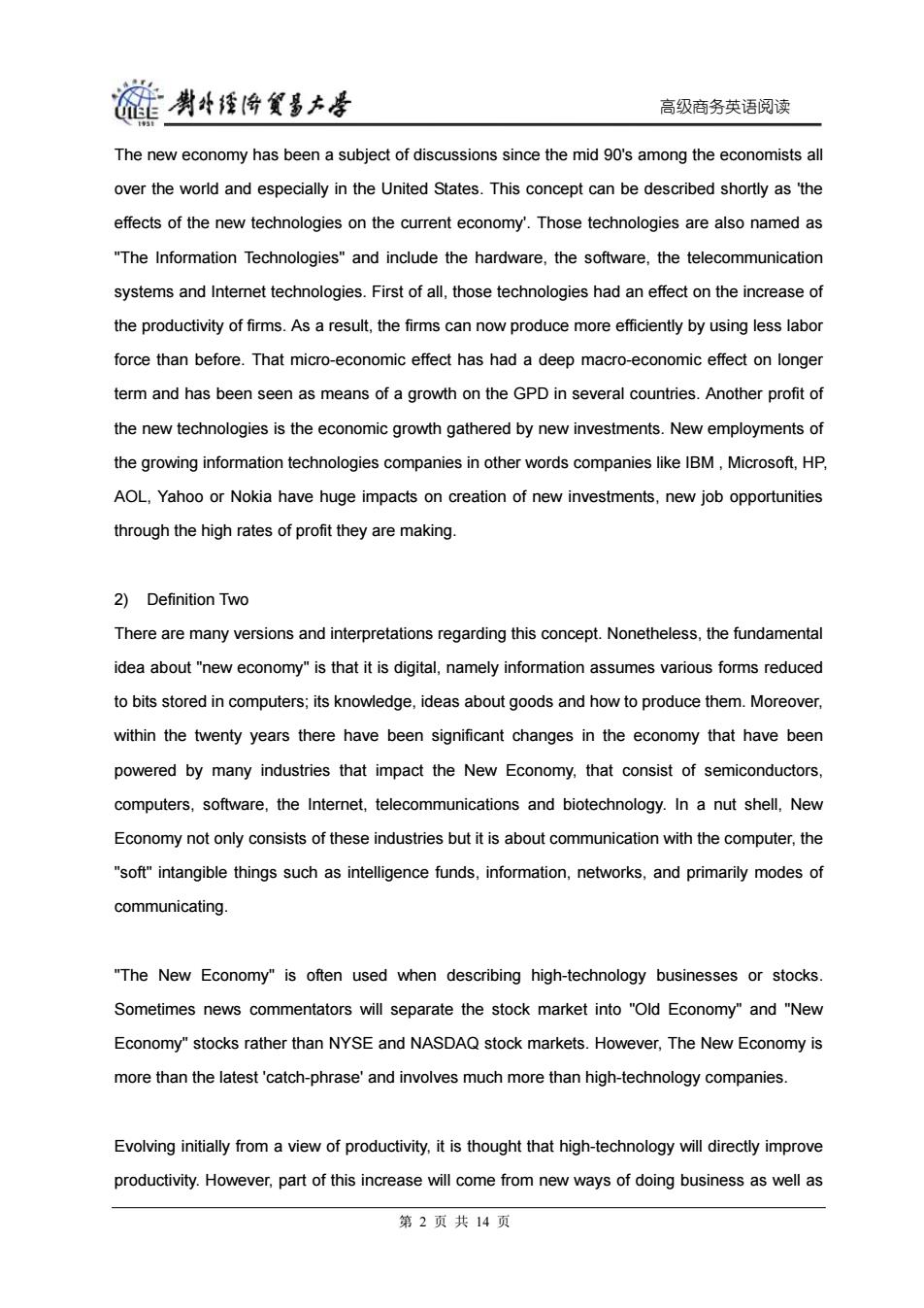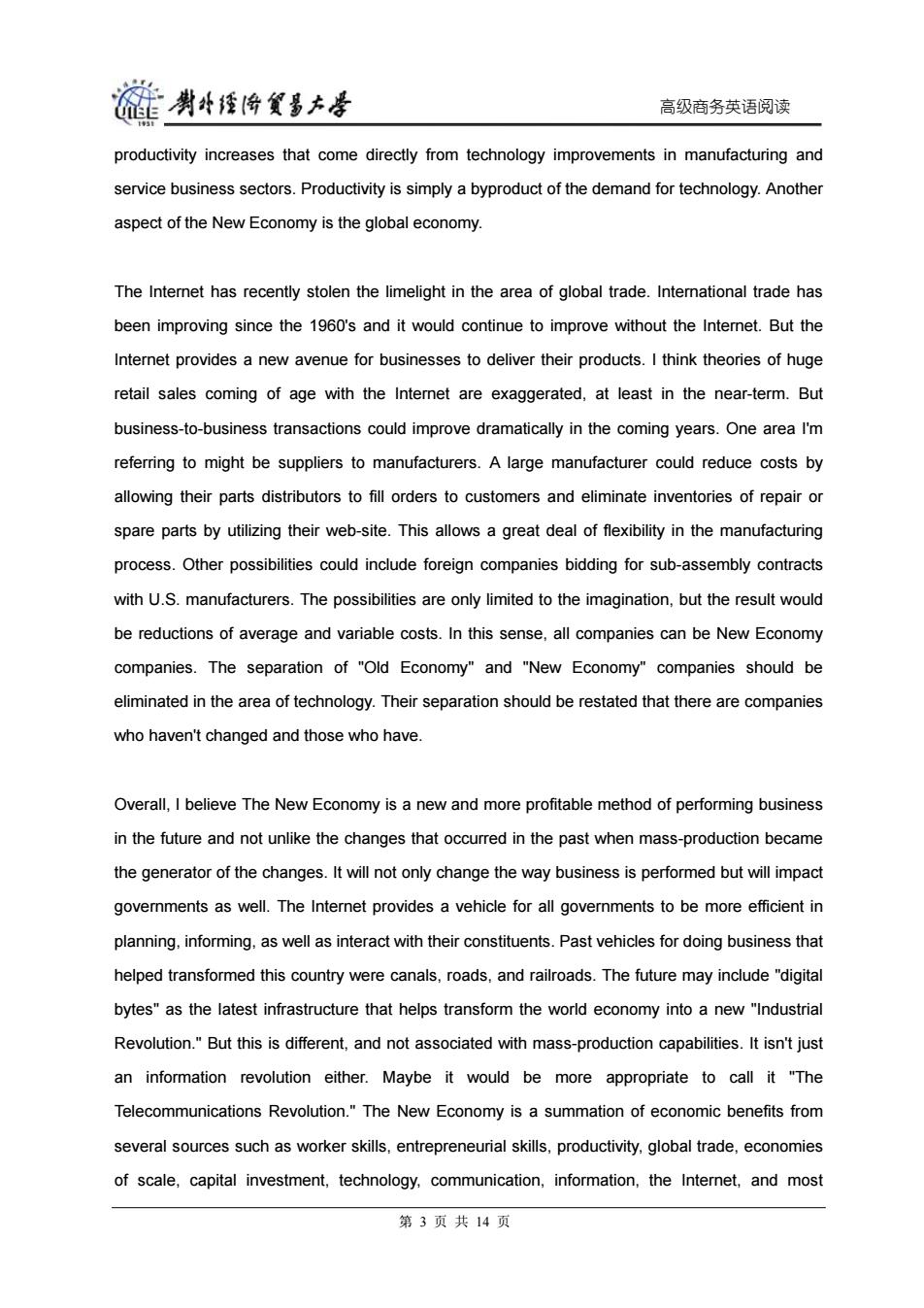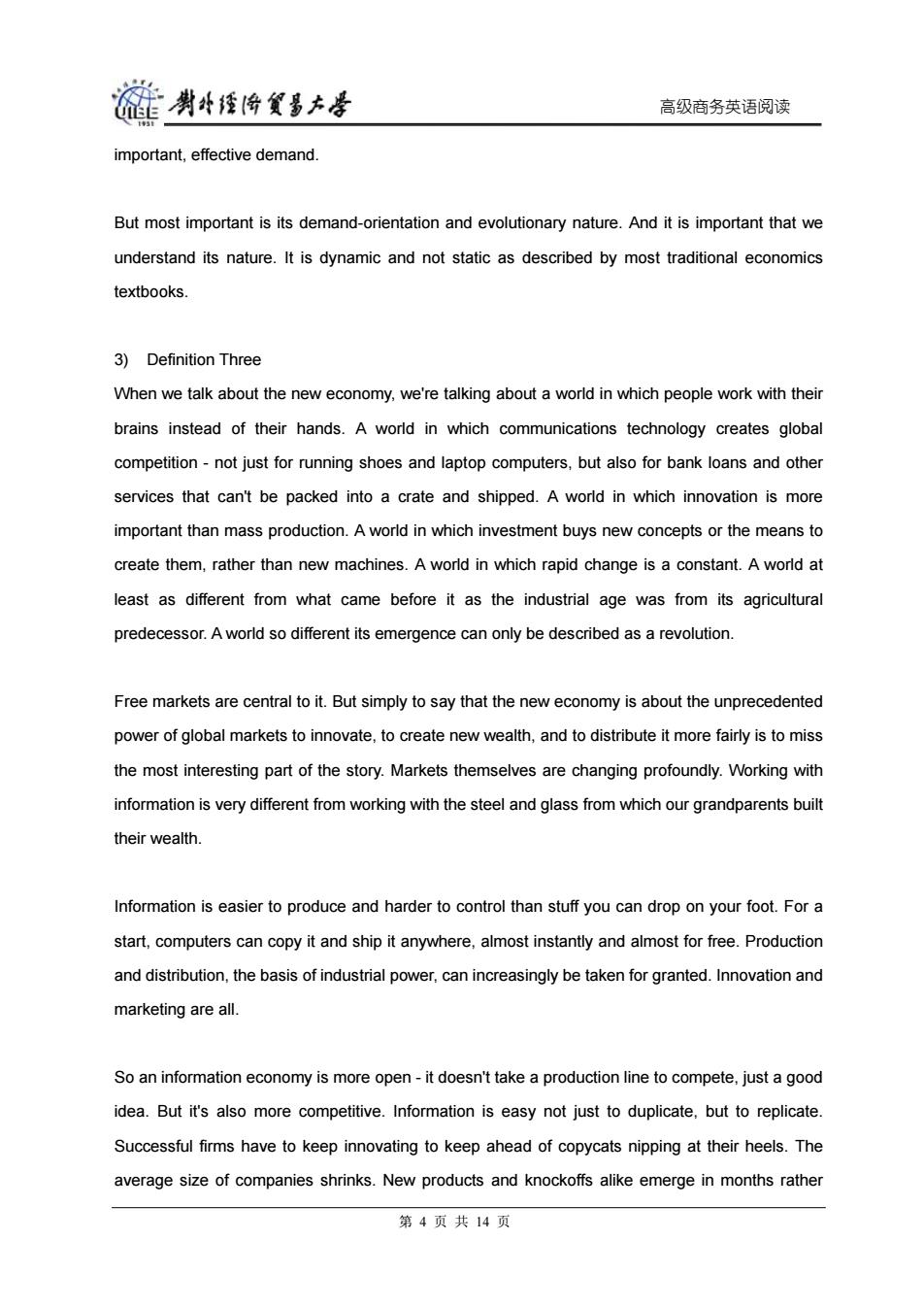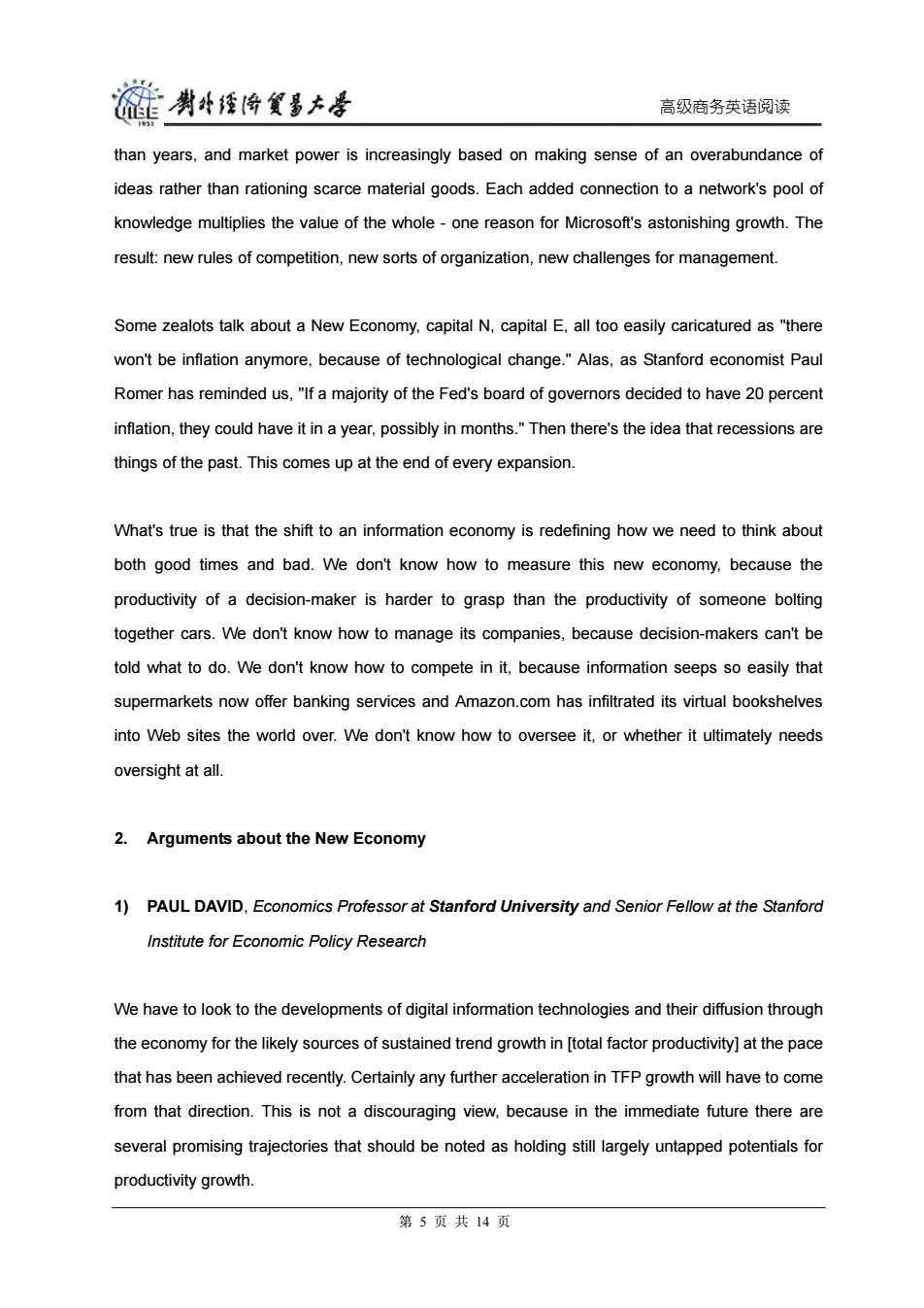
裢贵华经汾贸墨去号 高级商务英语阅读 Chapter 2 The New Economy 1.教学目的 什么叫新经济?是否有新经济?这是一个从来就没有定论的问题,世界经济界的学者们分成两 派,各自都拿出了许多实证、理由来论证自己的观点,并试图说服对方。通过本文的学习,使学生 了解支持派和反对派的观点和论说,并从历史的角度帮助学生体会对经济规模和管理的发展趋势。 本文涉及到许多经贸商务知识,如:供应链、库存周转率、规模经济、产业调整等,学生应掌握这 些重要的概念。但最重要的目的是通过本课文的学习增强学生对上述内容的英语表达能力。 川.教学计划 拟使用六课时完成本课内容。一课时介绍背景知识及相关的课堂交流,三个半课时用于课文讲 解及难点、重点讨论,最后一个半课时就与课文相关的问题(如:不同历史阶段技术革新对经济和 管理带来的影响等)展开讨论。 川.教学方法: 以学生为中心,通过师生互动、各抒己见的方式理解和认识课文中涉及到的问题(包括知识点 和语言方面的问题)。 IV.背景知识 1.Definitions to New Economy The term "new economy"has been bandied in the 1990s by journalists,academics,and policy makers in such vague and diverse contexts that the term itself has become synonymous with anything and everything from greater yields on Kansas wheat farms,to better inventory control at Midwest auto parts factories,to billion-dollar IPOs for Silicon Valley dot-com companies.The argument over the existence and definition of the new economy started with the emergence of this term.Advocates and skeptics never come to terms with one another,though the balance now tips in favor of skeptics with the economic pendulum swings from boom to recession. 1)Definition One 第1页共14页
高级商务英语阅读 Chapter 2 The New Economy I.教学目的 什么叫新经济?是否有新经济?这是一个从来就没有定论的问题,世界经济界的学者们分成两 派,各自都拿出了许多实证、理由来论证自己的观点,并试图说服对方。通过本文的学习,使学生 了解支持派和反对派的观点和论说,并从历史的角度帮助学生体会对经济规模和管理的发展趋势。 本文涉及到许多经贸商务知识,如:供应链、库存周转率、规模经济、产业调整等,学生应掌握这 些重要的概念。但最重要的目的是通过本课文的学习增强学生对上述内容的英语表达能力。 II.教学计划 拟使用六课时完成本课内容。一课时介绍背景知识及相关的课堂交流,三个半课时用于课文讲 解及难点、重点讨论,最后一个半课时就与课文相关的问题(如:不同历史阶段技术革新对经济和 管理带来的影响等)展开讨论。 III.教学方法: 以学生为中心,通过师生互动、各抒己见的方式理解和认识课文中涉及到的问题(包括知识点 和语言方面的问题)。 IV.背景知识 1.Definitions to New Economy The term "new economy" has been bandied in the 1990s by journalists, academics, and policy makers in such vague and diverse contexts that the term itself has become synonymous with anything and everything from greater yields on Kansas wheat farms, to better inventory control at Midwest auto parts factories, to billion-dollar IPOs for Silicon Valley dot-com companies. The argument over the existence and definition of the new economy started with the emergence of this term. Advocates and skeptics never come to terms with one another, though the balance now tips in favor of skeptics with the economic pendulum swings from boom to recession. 1) Definition One 第 1 页 共 14 页

链男母经降贸多大量 高级商务英语阅读 The new economy has been a subject of discussions since the mid 90's among the economists all over the world and especially in the United States.This concept can be described shortly as 'the effects of the new technologies on the current economy'.Those technologies are also named as "The Information Technologies"and include the hardware,the software,the telecommunication systems and Internet technologies.First of all,those technologies had an effect on the increase of the productivity of firms.As a result,the firms can now produce more efficiently by using less labor force than before.That micro-economic effect has had a deep macro-economic effect on longer term and has been seen as means of a growth on the GPD in several countries.Another profit of the new technologies is the economic growth gathered by new investments.New employments of the growing information technologies companies in other words companies like IBM,Microsoft,HP. AOL,Yahoo or Nokia have huge impacts on creation of new investments,new job opportunities through the high rates of profit they are making. 2)Definition Two There are many versions and interpretations regarding this concept.Nonetheless,the fundamental idea about"new economy"is that it is digital,namely information assumes various forms reduced to bits stored in computers;its knowledge,ideas about goods and how to produce them.Moreover, within the twenty years there have been significant changes in the economy that have been powered by many industries that impact the New Economy,that consist of semiconductors, computers,software,the Internet,telecommunications and biotechnology.In a nut shell,New Economy not only consists of these industries but it is about communication with the computer,the "soft"intangible things such as intelligence funds,information,networks,and primarily modes of communicating. "The New Economy"is often used when describing high-technology businesses or stocks. Sometimes news commentators will separate the stock market into "Old Economy"and "New Economy"stocks rather than NYSE and NASDAQ stock markets.However,The New Economy is more than the latest'catch-phrase'and involves much more than high-technology companies. Evolving initially from a view of productivity,it is thought that high-technology will directly improve productivity.However,part of this increase will come from new ways of doing business as well as 第2页共14页
高级商务英语阅读 The new economy has been a subject of discussions since the mid 90's among the economists all over the world and especially in the United States. This concept can be described shortly as 'the effects of the new technologies on the current economy'. Those technologies are also named as "The Information Technologies" and include the hardware, the software, the telecommunication systems and Internet technologies. First of all, those technologies had an effect on the increase of the productivity of firms. As a result, the firms can now produce more efficiently by using less labor force than before. That micro-economic effect has had a deep macro-economic effect on longer term and has been seen as means of a growth on the GPD in several countries. Another profit of the new technologies is the economic growth gathered by new investments. New employments of the growing information technologies companies in other words companies like IBM , Microsoft, HP, AOL, Yahoo or Nokia have huge impacts on creation of new investments, new job opportunities through the high rates of profit they are making. 2) Definition Two There are many versions and interpretations regarding this concept. Nonetheless, the fundamental idea about "new economy" is that it is digital, namely information assumes various forms reduced to bits stored in computers; its knowledge, ideas about goods and how to produce them. Moreover, within the twenty years there have been significant changes in the economy that have been powered by many industries that impact the New Economy, that consist of semiconductors, computers, software, the Internet, telecommunications and biotechnology. In a nut shell, New Economy not only consists of these industries but it is about communication with the computer, the "soft" intangible things such as intelligence funds, information, networks, and primarily modes of communicating. "The New Economy" is often used when describing high-technology businesses or stocks. Sometimes news commentators will separate the stock market into "Old Economy" and "New Economy" stocks rather than NYSE and NASDAQ stock markets. However, The New Economy is more than the latest 'catch-phrase' and involves much more than high-technology companies. Evolving initially from a view of productivity, it is thought that high-technology will directly improve productivity. However, part of this increase will come from new ways of doing business as well as 第 2 页 共 14 页

剥牛煙将多大是 高级商务英语阅读 productivity increases that come directly from technology improvements in manufacturing and service business sectors.Productivity is simply a byproduct of the demand for technology.Another aspect of the New Economy is the global economy. The Internet has recently stolen the limelight in the area of global trade.Intemnational trade has been improving since the 1960's and it would continue to improve without the Internet.But the Internet provides a new avenue for businesses to deliver their products.I think theories of huge retail sales coming of age with the Internet are exaggerated,at least in the near-term.But business-to-business transactions could improve dramatically in the coming years.One area I'm referring to might be suppliers to manufacturers.A large manufacturer could reduce costs by allowing their parts distributors to fill orders to customers and eliminate inventories of repair or spare parts by utilizing their web-site.This allows a great deal of flexibility in the manufacturing process.Other possibilities could include foreign companies bidding for sub-assembly contracts with U.S.manufacturers.The possibilities are only limited to the imagination,but the result would be reductions of average and variable costs.In this sense,all companies can be New Economy companies.The separation of "Old Economy"and "New Economy"companies should be eliminated in the area of technology.Their separation should be restated that there are companies who haven't changed and those who have. Overall,I believe The New Economy is a new and more profitable method of performing business in the future and not unlike the changes that occurred in the past when mass-production became the generator of the changes.It will not only change the way business is performed but will impact governments as well.The Internet provides a vehicle for all governments to be more efficient in planning,informing,as well as interact with their constituents.Past vehicles for doing business that helped transformed this country were canals,roads,and railroads.The future may include "digital bytes"as the latest infrastructure that helps transform the world economy into a new"Industrial Revolution."But this is different,and not associated with mass-production capabilities.It isn't just an information revolution either.Maybe it would be more appropriate to call it "The Telecommunications Revolution."The New Economy is a summation of economic benefits from several sources such as worker skills,entrepreneurial skills,productivity,global trade,economies of scale,capital investment,technology,communication,information,the Internet,and most 第3页共14页
高级商务英语阅读 productivity increases that come directly from technology improvements in manufacturing and service business sectors. Productivity is simply a byproduct of the demand for technology. Another aspect of the New Economy is the global economy. The Internet has recently stolen the limelight in the area of global trade. International trade has been improving since the 1960's and it would continue to improve without the Internet. But the Internet provides a new avenue for businesses to deliver their products. I think theories of huge retail sales coming of age with the Internet are exaggerated, at least in the near-term. But business-to-business transactions could improve dramatically in the coming years. One area I'm referring to might be suppliers to manufacturers. A large manufacturer could reduce costs by allowing their parts distributors to fill orders to customers and eliminate inventories of repair or spare parts by utilizing their web-site. This allows a great deal of flexibility in the manufacturing process. Other possibilities could include foreign companies bidding for sub-assembly contracts with U.S. manufacturers. The possibilities are only limited to the imagination, but the result would be reductions of average and variable costs. In this sense, all companies can be New Economy companies. The separation of "Old Economy" and "New Economy" companies should be eliminated in the area of technology. Their separation should be restated that there are companies who haven't changed and those who have. Overall, I believe The New Economy is a new and more profitable method of performing business in the future and not unlike the changes that occurred in the past when mass-production became the generator of the changes. It will not only change the way business is performed but will impact governments as well. The Internet provides a vehicle for all governments to be more efficient in planning, informing, as well as interact with their constituents. Past vehicles for doing business that helped transformed this country were canals, roads, and railroads. The future may include "digital bytes" as the latest infrastructure that helps transform the world economy into a new "Industrial Revolution." But this is different, and not associated with mass-production capabilities. It isn't just an information revolution either. Maybe it would be more appropriate to call it "The Telecommunications Revolution." The New Economy is a summation of economic benefits from several sources such as worker skills, entrepreneurial skills, productivity, global trade, economies of scale, capital investment, technology, communication, information, the Internet, and most 第 3 页 共 14 页

碰男华经海贸多大学 高级商务英语阅读 important,effective demand. But most important is its demand-orientation and evolutionary nature.And it is important that we understand its nature.It is dynamic and not static as described by most traditional economics textbooks. 3)Definition Three When we talk about the new economy,we're talking about a world in which people work with their brains instead of their hands.A world in which communications technology creates global competition-not just for running shoes and laptop computers,but also for bank loans and other services that can't be packed into a crate and shipped.A world in which innovation is more important than mass production.A world in which investment buys new concepts or the means to create them,rather than new machines.A world in which rapid change is a constant.A world at least as different from what came before it as the industrial age was from its agricultural predecessor.A world so different its emergence can only be described as a revolution. Free markets are central to it.But simply to say that the new economy is about the unprecedented power of global markets to innovate,to create new wealth,and to distribute it more fairly is to miss the most interesting part of the story.Markets themselves are changing profoundly.Working with information is very different from working with the steel and glass from which our grandparents built their wealth. Information is easier to produce and harder to control than stuff you can drop on your foot.For a start,computers can copy it and ship it anywhere,almost instantly and almost for free.Production and distribution,the basis of industrial power,can increasingly be taken for granted.Innovation and marketing are all. So an information economy is more open-it doesn't take a production line to compete,just a good idea.But it's also more competitive.Information is easy not just to duplicate,but to replicate. Successful firms have to keep innovating to keep ahead of copycats nipping at their heels.The average size of companies shrinks.New products and knockoffs alike emerge in months rather 第4页共14页
高级商务英语阅读 important, effective demand. But most important is its demand-orientation and evolutionary nature. And it is important that we understand its nature. It is dynamic and not static as described by most traditional economics textbooks. 3) Definition Three When we talk about the new economy, we're talking about a world in which people work with their brains instead of their hands. A world in which communications technology creates global competition - not just for running shoes and laptop computers, but also for bank loans and other services that can't be packed into a crate and shipped. A world in which innovation is more important than mass production. A world in which investment buys new concepts or the means to create them, rather than new machines. A world in which rapid change is a constant. A world at least as different from what came before it as the industrial age was from its agricultural predecessor. A world so different its emergence can only be described as a revolution. Free markets are central to it. But simply to say that the new economy is about the unprecedented power of global markets to innovate, to create new wealth, and to distribute it more fairly is to miss the most interesting part of the story. Markets themselves are changing profoundly. Working with information is very different from working with the steel and glass from which our grandparents built their wealth. Information is easier to produce and harder to control than stuff you can drop on your foot. For a start, computers can copy it and ship it anywhere, almost instantly and almost for free. Production and distribution, the basis of industrial power, can increasingly be taken for granted. Innovation and marketing are all. So an information economy is more open - it doesn't take a production line to compete, just a good idea. But it's also more competitive. Information is easy not just to duplicate, but to replicate. Successful firms have to keep innovating to keep ahead of copycats nipping at their heels. The average size of companies shrinks. New products and knockoffs alike emerge in months rather 第 4 页 共 14 页

链潮4将置多大孝 高级商务英语阅读 than years,and market power is increasingly based on making sense of an overabundance of ideas rather than rationing scarce material goods.Each added connection to a network's pool of knowledge multiplies the value of the whole-one reason for Microsoft's astonishing growth.The result:new rules of competition,new sorts of organization,new challenges for management. Some zealots talk about a New Economy,capital N,capital E,all too easily caricatured as"there won't be inflation anymore,because of technological change."Alas,as Stanford economist Paul Romer has reminded us,"If a majority of the Fed's board of governors decided to have 20 percent inflation,they could have it in a year,possibly in months."Then there's the idea that recessions are things of the past.This comes up at the end of every expansion. What's true is that the shift to an information economy is redefining how we need to think about both good times and bad.We don't know how to measure this new economy,because the productivity of a decision-maker is harder to grasp than the productivity of someone bolting together cars.We don't know how to manage its companies,because decision-makers can't be told what to do.We don't know how to compete in it,because information seeps so easily that supermarkets now offer banking services and Amazon.com has infiltrated its virtual bookshelves into Web sites the world over.We don't know how to oversee it,or whether it ultimately needs oversight at all. 2.Arguments about the New Economy 1) PAUL DAVID,Economics Professor at Stanford University and Senior Fellow at the Stanford Institute for Economic Policy Research We have to look to the developments of digital information technologies and their diffusion through the economy for the likely sources of sustained trend growth in [total factor productivity]at the pace that has been achieved recently.Certainly any further acceleration in TFP growth will have to come from that direction.This is not a discouraging view,because in the immediate future there are several promising trajectories that should be noted as holding still largely untapped potentials for productivity growth. 第5页共14页
高级商务英语阅读 than years, and market power is increasingly based on making sense of an overabundance of ideas rather than rationing scarce material goods. Each added connection to a network's pool of knowledge multiplies the value of the whole - one reason for Microsoft's astonishing growth. The result: new rules of competition, new sorts of organization, new challenges for management. Some zealots talk about a New Economy, capital N, capital E, all too easily caricatured as "there won't be inflation anymore, because of technological change." Alas, as Stanford economist Paul Romer has reminded us, "If a majority of the Fed's board of governors decided to have 20 percent inflation, they could have it in a year, possibly in months." Then there's the idea that recessions are things of the past. This comes up at the end of every expansion. What's true is that the shift to an information economy is redefining how we need to think about both good times and bad. We don't know how to measure this new economy, because the productivity of a decision-maker is harder to grasp than the productivity of someone bolting together cars. We don't know how to manage its companies, because decision-makers can't be told what to do. We don't know how to compete in it, because information seeps so easily that supermarkets now offer banking services and Amazon.com has infiltrated its virtual bookshelves into Web sites the world over. We don't know how to oversee it, or whether it ultimately needs oversight at all. 2. Arguments about the New Economy 1) PAUL DAVID, Economics Professor at Stanford University and Senior Fellow at the Stanford Institute for Economic Policy Research We have to look to the developments of digital information technologies and their diffusion through the economy for the likely sources of sustained trend growth in [total factor productivity] at the pace that has been achieved recently. Certainly any further acceleration in TFP growth will have to come from that direction. This is not a discouraging view, because in the immediate future there are several promising trajectories that should be noted as holding still largely untapped potentials for productivity growth. 第 5 页 共 14 页